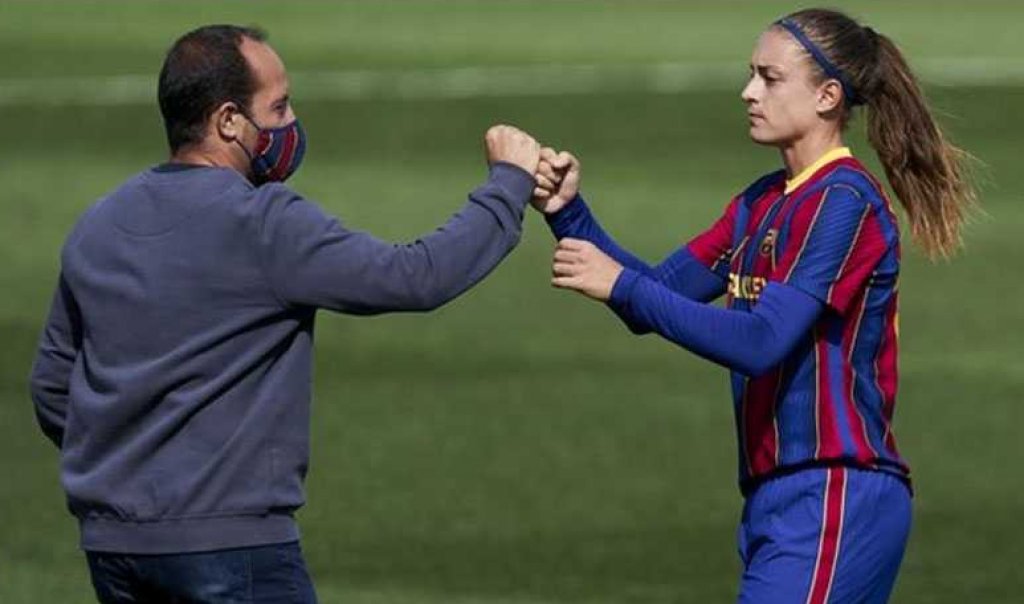Coach Lluis Cortes won the Treble last season with a Barcelona team spearheaded by Alexia Putellas
If in doubt, pass to Alexia.
That was the motto of former Barcelona coach Lluis Cortes, whose all-conquering Catalan side won their first Women’s Champions League title last season, along with a domestic Double.
His team was bursting with talent – the likes of Spain’s all-time top scorer Jenni Hermoso, Norway winger Caroline Graham Hansen and Netherlands midfielder Lieke Martens – but it was Alexia Putellas who Cortes, and his players, would turn to in difficult moments.
Two years ago the Spanish attacking midfielder wasn’t among football’s glitterati. Despite being a constant presence for Barcelona and the national team over the past decade, it was her team-mates who got the global recognition. That has all changed now. In recent months Putellas has landed a string of individual awards – the Ballon d’Or, Best Fifa Women’s player, and Uefa Player of the Year, to name a few.
Over the next week, she will grace pitches in England as part of the Spain squad competing in the four-team Arnold Clark Cup, starting on 17 February, involving England as hosts, Canada and Germany.
Cortes, who left the Nou Camp at the end of last season, told BBC Sport how his former playmaker was a coach’s dream to work with.
“I was so privileged to be the head coach of her,” he said. “Alexia is a player who you can always speak to about everything in the game, because she understands the game very well.”
It is not just her own talents such as “incredible movement” that make her special, he says, but “she makes all the other players be better” and gives advice during matches.
“I always said to the players, if you don’t know what to do with the ball, pass to Alexia and she will know. She is able to make the best decisions every time.”
Goals galore
Putellas’ statistics speak for themselves. She scored 26 goals and provided 19 assists in her club’s Treble-winning campaign. In September she scored her 150th Barca goal, and finished 2021 with 93 Spanish caps having become the most-capped player for the women’s team, who were unbeaten in the calendar year.
Running games from midfield, the Spaniard, who had a goal and an assist in the 4-0 demolition of Chelsea in May’s Champions League final, is the heartbeat of her club and national side.
She links defence and attack, creating chances for her team-mates as well as routinely popping up as the matchwinner.
Alexia Putellas is congratulated by her Spanish team-mates the day after winning the Ballon d’Or
Turning 28 at the start of this month, Putellas’ emergence into the spotlight has been gradual, and Cortes says it wasn’t always inevitable that she would reach the top.
He first worked with her when he was head coach of the Catalan national team about eight years ago. “You saw her and you thought ‘OK she’s a really good player but at the moment she is not the best. She is good but she has to improve a lot of things’.
“But the best thing about Alexia is she knew that, and she was a very hard worker. She was working every day to become the best in the world.
“I remember during training she was always asking how she can improve, what she can do better.
“When we finished matches she never asked ‘what did I do well?’, she always asked ‘what did I do wrong and what do I have to improve to be better?'”
Always wanting ‘more’
A lifelong Barca fan, Putellas grew up in a small town in Catalonia, called Mollet del Valles, on the outskirts of Barcelona, getting the bus with her family to go to matches at the Nou Camp.
Speaking to the Players’ Tribune this month,
she said “since I was a little kid, the goal was to play for Barca”.
She continued: “I used to overhear things like ‘this girl has something – she’s special’. But I didn’t really pay attention. I just wanted to play. And I played whenever, wherever I could. If my parents were getting a coffee in the plaza, I would grab my ball and do shooting practice against the wall of the town hall.”
A spell at Barcelona’s academy when she was 11 years old was short-lived and she joined Espanyol, where she made her debut aged 16. She spent a season at Levante before finally rejoining the club she idolised in 2012.
Her desire to play football hadn’t diminished through her teens.
“When I was a student, I still couldn’t get enough. I was studying at uni in the morning and training in the evening, but in my head I was already a pro. Back then, if I could’ve trained 24 hours a day, I would’ve done it,” Putellas told the Players’ Tribune.
It is this mentality which has Cortes predicting that his former protege will light up this summer’s Euros with Spain, who have never won a major international women’s tournament.
“She has not relaxed saying ‘OK, I am the best in the world, I can stop here’. No. Alexia always wants more and more – and more. It’s an optimum moment.”
| Arnold Clark Cup fixtures (all times GMT) | |
|---|---|
| Germany v Spain – 17 February (14:30) Riverside Stadium, Middlesbrough | England v Canada – 17 February (19:30) Riverside Stadium, Middlesbrough |
| England v Spain – 20 February (15:15) Carrow Road, Norwich | Canada v Germany – 20 February (20:15) Carrow Road, Norwich |
| Spain v Canada – 23 February (14:30) Molineux, Wolverhampton | England v Germany – 23 February (14:30) Molineux, Wolverhampton |


